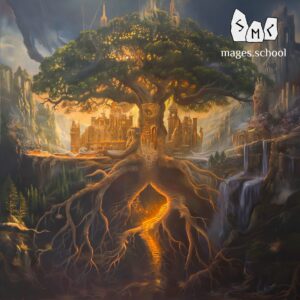Svartalfheimr. The World of Evil
Unlike Alfheimr, much more is said about this world in the sagas and eddas. In Svartalfheimr, not only the dark elves live, who are rarely mentioned in the sagas, but also the dwarves-zwergs, masterful craftsmen who provided the gods with the most marvellous magical artifacts, enchanted items, and animals. The “Voluspo” lists all the clans of zwergs and tells about the origin of the dark bloodlines.
The dark elves (svartálfar) are by nature closer to the jötnar than to the Vanir, unlike their light elf brothers. They are just as steadfast, just as mindful, and similarly not very fond of outsiders—neither gods nor heroes.
In Celtic mythology, light elves are known as the “Seelie Court,” and dark elves as the “Unseelie Court.” In magic, these two worlds correspond to the primary elements of Good and Evil, respectively.
Zwergs not only possess rich underground resources but also masterfully utilize them. Being inherently reclusive and having a very rigid caste system, they equally hate both humans and their “relatives,” the elves. Only to the gods and giants, recognizing their victory and supremacy, do they pay due respect.
Helheimr. The World of Hel
 According to the rules of the Yggdrasil system, the law introduced by Odin, everything that is not considered good by this law goes to the world of Hel. For humans, this rule was projected as the tradition of a proper departure from life: those who died with a weapon in their hands and Odin’s name on their lips are deemed worthy to go to Valhalla and become an einherjar—a warrior of Odin.
According to the rules of the Yggdrasil system, the law introduced by Odin, everything that is not considered good by this law goes to the world of Hel. For humans, this rule was projected as the tradition of a proper departure from life: those who died with a weapon in their hands and Odin’s name on their lips are deemed worthy to go to Valhalla and become an einherjar—a warrior of Odin.
All the others: women, children, those who died from illness, accidents, or other reasons, must go to Hel. Logic suggests that with such a strict selection, the world of Hel will eventually become very overcrowded, and the gates of Helheimr will open, releasing currents of chaos into the world. Ragnarök is inevitable.
In the Yggdrasil system, the world of Helheimr is essentially the mirror opposite of Asgard. Asgard embodies principles of development, while Helheimr embodies principles of destruction. However, this is not a complete and accurate description, and the essence of Helheimr can only be understood through the power and intellect of its ruler, the goddess Hel, which will be explored in due course.
Midgard
It would be a mistake to associate Midgard specifically with our planet; this is fundamentally incorrect. Such a misconception has led many seekers to make mistakes and draw wrong conclusions. Midgard is not here. Midgard is a present moment.
Midgard is the only world in the Yggdrasil system that does not have an obvious pair. It is bounded and finite, just as time in general and human time, in particular, are finite. The Midgard Serpent (Jörmungandr) encircles the human world and, like the Ouroboros serpent biting its own tail, acts as a timer, tightening the circle of time more and more. Everything has limits, and Midgard is the first world that depends on limits and deadlines, which people living in the here-and-now are well aware of.
Created from natural elements and lacking long memories, humans live only in the present moment. The past is changeable, and the future is undetermined. However, by stretching their consciousness across worlds, each person can alter their destiny: reach out with your mind to the world of ancient memory, understand your need, and by the law of the pendulum, consciousness will reach the world of Vanaheimr, changing the future. Expand your consciousness to such an extent, and you will come to know good and evil.
Humans, being at the centre of the rotation, generate the momentum of time, distributing this vital resource to all the worlds. It’s no coincidence that one of the roots nourishing the tree is situated in the human world: this nourishment is time.
All the worlds, connected into a system, form human life. By perceiving changes, a person initiates changes himself, which affects the other worlds. The Yggdrasil system contains all the regulatory mechanisms capable of halting unnecessary and untimely actions and, conversely, initiating necessary ones.
Textbook to the 2nd course (Runes and Gods) of the Runes Department.
Additional information:
